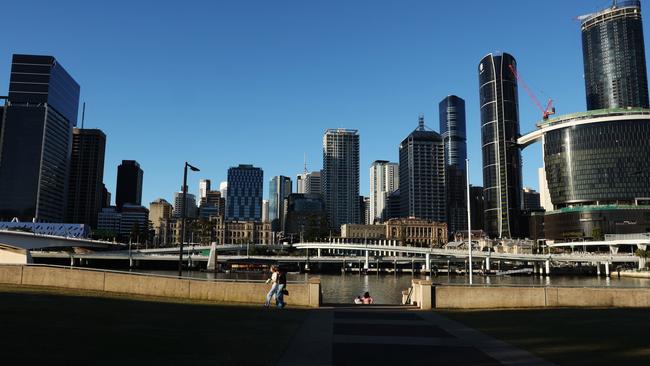Editorial: Attitude toward blue-collar jobs is holding us back
It is a baffling demographic issue that our state – and the nation in general – can’t fill well-paid blue-collar jobs, writes the editor.

Opinion
Don't miss out on the headlines from Opinion. Followed categories will be added to My News.
Queensland has always been a state with big dreams.
Unlike other states that were happy to play second fiddle to NSW and Victoria, we took the big boys on.
Our capital city was transformed from a “big country town” to a thriving metropolis to rival Sydney and Melbourne.
The Gold Coast grew from surf clubs and shacks to high-rises and bling in two generations.
The scale of our mining and pastoral industries are mind-boggling. We are a state that has never been afraid to grow.
And with our (generally) awesome climate and laid-back lifestyle, we have had no trouble attracting the people to help us build our dreams.
Until now – when the eyes of the whole world are upon us.
The major 2024 Market Capacity Report by Infrastructure Australia has warned that we have only half the construction workers we need for the state’s $47bn infrastructure pipeline.
About 74,000 workers are needed to build the pipeline of infrastructure – from road, to rail, renewable energy and hospitals – but the state will be short 35,000 personnel across the five-year program. The most in-demand jobs are general labourers where there is an estimated 8900 person shortfall, alongside a 3100 shortage of professional engineers and 2800 road-based civil plan operators.
Equally worrying is the fact that projects in the state’s north are finding it hardest to attract workers.
While the figures do not include work on 2032 Olympic and Paralympic projects, there will no doubt be issues finding workers for venues in such a tight job market.
It is a baffling demographic issue that our state – and the nation in general – can’t fill well-paid blue-collar jobs.
Federal governments have recognised this in recent years by incentivising TAFE, but still there are shortfalls that are holding our state and our nation back.
It seems that in the noble push to encourage further education for Australia’s youth we prioritised the university pathway but forgot the trades, while jobs like labouring still carry a stigma that are in no way reflected in pay and conditions.
It’s a trend that has moved past snobbishness. It is holding our nation back.
To reverse it we need to start at schools, where the messaging has always been that to be a success you need to go to university.
Adults know this is rubbish. Entrepreneurial, self-employed tradies can be incredibly successful while young men and women entering the construction industry can enjoy fantastic pay and conditions.
While vocational education and training in Years 10, 11 and 12 have helped to address white collar bias at schools, it’s clear much more needs to be done to end the blue-collar stigma.
Parents need to play their part in explaining the incredible work opportunities that are coming.
Queensland’s and Australia’s future depends on it.
STILL LEARNING FROM TRACY
It’s hard to believe it’s been 50 years since Australians woke on Christmas morning as news began to trickle in that the city of Darwin had been destroyed by a cyclone.
Not damaged or decimated, but destroyed. Most houses were virtually blown away.
Almost 95 per cent of dwellings were rendered uninhabitable.
And public buildings fared no better.
At least 66 people were killed – an incredibly small number given the scale of destruction – but the city had to be rebuilt at enormous cost. But the destruction of Darwin proved to be a line-in-the-sand moment for northern Australian communities.
No longer could they play Russian roulette with natural disasters.
The Australian Strategic Policy Institute recently published a report on the legacy of Cyclone Tracy, particularly in light of “cascading disasters” exacerbated by climate change.
“The legacy of Cyclone Tracy is clear: resilience is not just about recovery, but about preparation,” the report says. “As Australia faces the challenges of climate change, we must build on the lessons of the past to ensure a safer, more resilient future. This anniversary is an opportunity to strengthen our commitment to disaster preparedness, ensuring that Australia remains a global leader in disaster resilience and recovery.”
It is a salient point.
As Queenslanders we are familiar with natural disasters, but we cannot afford to sit on our hands expecting modern building standards and disaster management to always be enough. We must constantly search for better ways to ensure that, whatever nature throws at us, there will never be a repeat of Cyclone Tracy.



